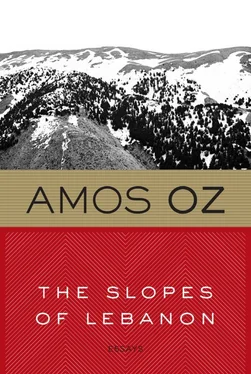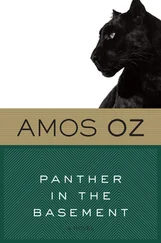Primeval, dark panic.
The courageous-cowardly Israeli will invariably respond with this stock answer: “If you give them Nablus and Gaza, tomorrow they’ll want Jaffa and Haifa as well.”
And if you don’t give them Nablus and Gaza, they won’t want Jaffa and Haifa?
And if they do want Jaffa and Haifa, what of it?
What, then, is the heart of the fear? What is the latent menace for us in a tiny Palestine? Why has the idea of a Long Island-size state between Hebron and Nablus turned into the straw that breaks the camel’s back, into the pea that disturbs the sleep of the Israeli princess who has lain, for tens of years, on the explosive stack of mattresses of several large enemy nations?
Perhaps because Palestine arouses in us a dim, repressed sense of guilt: If retaining Nablus is a crime, then maybe retaining Jaffa and Haifa is also a crime. If this is indeed the crux of the fear, the source of the mysterious sense of terror, then we need emergency shock treatment to bring us to the elementary understanding that the issue is not one of crime and punishment, the issue is the choice between life and death. We are talking not about guilt and penitence but about concluding a sensible deal between two parties with no love lost between them. Retaining Jaffa and Haifa was not — is not — a crime, for an abundance of reasons, but the simplest reason is sufficient: Without Jaffa and Haifa we cannot survive. Nablus and Hebron are an entirely different matter, for a number of reasons, the simplest among them being that we can live very well even if we discard them. Only the blind cannot see that we can barely survive if we do not discard them. The time has long since arrived for us to part from them peaceably, under conditions which will prevent them from threatening us in the future.
And if the Palestinians deceive us? It will always be easier for the Israel Defense Forces to break the backbone of the tiny Palestinian state than to break the backbone of an eight-year-old Palestinian stone thrower.
Davar, December 23, 1988
He Raises the Weak from the Dust and Lifts the Poor Out of the Dirt
I Samuel 2:8, Psalms 113:7
Remarks made upon receiving an honorary doctorate from the Hebrew Union College — Jewish Institute of Religion, Jerusalem, March 10, 1988
MR. PRESIDENT, HONORED guests, and friends:
With your permission, I would like to speak today not about exceptions to the norm but about the norm itself; more precisely, about new standards that have become increasingly common. It is not difficult to denounce a gross deviation, to bring a monstrous deviant to justice. One can punish the deviant as long as the standard itself is humane.
A short story from the tales of Israel: Long before the current Palestinian uprising, in October 1982, a man named Nissan Ishgoyev was driving the garbage truck that belonged to the Jewish settlement of Hinanit. Several children, among them a thirteen-year-old boy named Hisham Lofti Maslem, threw stones at the garbage truck driven by the man from Hinanit. The driver made a U-turn and went back. But before doing so, he got out of his truck for a moment, aimed his Uzi just a bit (not in warning, not to shoot at legs, but to wound and kill), fired — just a bit — straight from the hip, and killed thirteen-year-old Hisham — just a bit. Then he finished making his turn and continued on his way.
So far, it would seem, a deviation par excellence. And now for the norm. Five years have passed — which our man, Nissan, from Hinanit has not spent behind bars. In February 1988, the honorable Judge Uri Strosman passes sentence on the sharpshooter from Hinanit. First of all, he finds the accused guilty of manslaughter, a charge that, under the law, carries a sentence of up to twenty years in prison. But the judge sentences him only to six months’ imprisonment, which, the judge declares, are to be completed not in jail but in community service. “There is no doubt,” Judge Strosman writes in his decision, which I quote here verbatim, “that it is forbidden to shoot stone throwers. It would have been sufficient to fire into the air in order to disperse them.” And another astonishing quote from this sensible judge: “In these turbulent times, children and young people should be under parental supervision.” Turbulent times indeed! Parents who do not supervise their children carefully had better not be upset if their children get killed. And does a child who strays from the watchful eyes of his parents during these turbulent times deserve to die?
The question has already been raised: Would the man from Hinanit have shot to kill Jewish stone throwers in Jerusalem? Or a neighbor’s child who had thrown a rock at his window or at his garbage truck? Would the honorable judge have settled for a sentence of six months of community service if the victim of the accused had not been an Arab child? If Hisham’s bereaved parents, upon hearing Judge Strosman pronounce sentence, had burst into the courtroom, hurling epithets we are unfortunately accustomed to hearing on the playing field, wouldn’t they have been punished more severely for contempt of court than was the killer from Hinanit?
It is all a matter of standards. You may ask why I mix dirty politics with a festive ceremony of awards at this distinguished academic institution. Very well. I do so because the issue here is not one of deviants or lunatic fringes. What is at issue here are basic values. And therefore I say that this is not a question of politics or security, not of borders and diplomacy. We are talking about the very essence of Judaism today, about the raison d’etre of a Jewish state. And if the subject is, among other things, the essence of Judaism today and the purpose of a Jewish state, then it is not only permissible but also imperative that we deal with it, especially here and especially now.
The code of Hammurabi decrees one sentence, relatively light, for the killer of a slave who is old and tired. A harsher sentence is decreed for the killer of a slave who is young and in good health. The punishment for the killer of a free man is far more severe, and the most drastic penalty is reserved for one who has murdered an eminent figure, such as a judge. To our great consternation the leftists who legislated the Ten Commandments decreed only four simple, unambiguous words: “Thou shalt not murder.” It was as simple as that, without classifications or categories. Perhaps they forgot to add, in parentheses, somewhere in between “Thou shalt not murder” and “Shall you murder and then inherit?” the phrase “Once an Arab, always an Arab.” Perhaps they forgot to emphasize that the Ten Commandments apply only within the Green Line, and then only to a Jew born of a Jewish mother or converted according to Orthodox Halakah — except for leftists, who are worse than Gentiles.
Do I exaggerate? Do I overstate my fear of those who now sully not only the State of Israel, not only Zionism, but also Judaism itself? Several weeks ago, the Holy Spirit suddenly descended upon Israel’s Chief Rabbi Eliyahu, whereupon he made a normative declaration of his own, in keeping with the spirit of ancient Israel and the best Jewish tradition: “We,” said the venerable rabbi, “lifted the Arabs from the dirt and they,” he added sadly, “are not even grateful.” This is indeed a weighty conundrum in Judaism. Who now “raises the weak from the dust and lifts the poor from the dirt”? And who is ungrateful? Well imagine, my esteemed professors, how the earth would shake if some anti-Semitic cardinal or archbishop in America should dare to say that “we Americans lifted those Jews from the dirt and they, alas, are not grateful.” And in such a case, the sin of the archbishop would still be less than that of the venerable rabbi. The truth is that vast sums of American money have gone to improve the material situation of both Jews and Arabs in Israel, even though the enormous funds have actually reduced our ethics, perhaps, to garbage. But that is a different story.
Читать дальше












